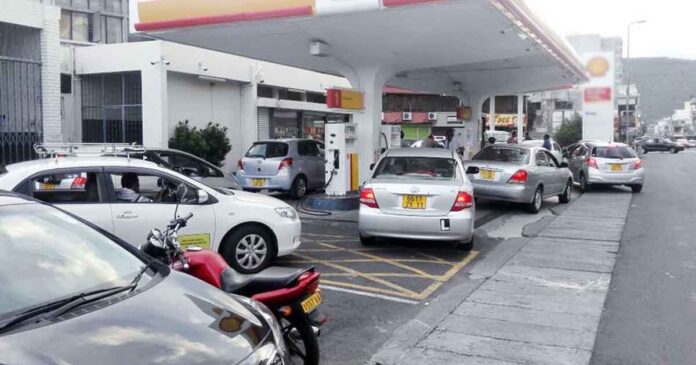Petrol price is estimated to decrease by Rs 1.87 per litre, high speed diesel (HSD) price might see a significant surge of Rs 3.29 per litre, posing challenges for consumers and industries alike.
According to sources within the industry, the proposed changes in petrol and diesel prices are based on the current rate of Petroleum Levy and GST. The Pakistan State Oil (PSO) exchange adjustment for petrol is estimated at Rs 3.50 per litre, while for diesel, it stands at Rs 0.31 per litre. Similarly, the government currently imposes an Inland Freight Equalization Margin (IFEM) of Rs 4.04 per litre on petrol and Rs 3.79 per litre on diesel. Likewise, at present the petroleum levy is fixed at Rs 50/litre on petrol and diesel (HSD). Likewise, Oil marketing Companies (OMCs) margin on the sale of petrol (92 RON) is fixed at Rs 6/litre and Rs 5/litre on HSD. Furthermore, fixed dealer’s commission on the sale of petrol and HSD currently stands at Rs Rs7/litre.
If approved, the decrease in petrol price would result in an ex-depot price of Rs 260.13 per litre, compared to the current market rate of Rs 262 per litre. However, diesel price could soar to an ex-depot price of Rs 256.29 per litre, rising from the current market rate of Rs 253 per litre. These potential changes have raised concerns among consumers who rely heavily on diesel for transportation and power generation.
In contrast, kerosene prices are expected to witness a hike of Rs 2.10 per litre, reaching an ex-depot price of Rs 166.17 per litre, while Light Diesel Oil (LDO) might experience an increase of Rs 2.48 per litre, bringing the ex-depot price to Rs 150.16 per litre. These adjustments could impact households relying on kerosene for cooking and LDO for various industrial processes.
The fluctuations in fuel prices reflect the government’s ongoing efforts to strike a balance between stabilizing the economy and addressing the challenges in the energy sector. The government aims to maintain reasonable prices for citizens while managing the fiscal constraints faced by the country.
The anticipated decrease in petrol prices is expected to provide some relief to motorists, as the cost of running vehicles is likely to be slightly reduced. However, the substantial increase in diesel prices might pose a burden on industries such as transportation, agriculture, and manufacturing, where diesel is a primary source of fuel.
As the government finalizes its decision on fuel prices, stakeholders are closely monitoring the situation, anticipating the impact it will have on their operations and expenses. The fluctuations in fuel prices could have broader implications for the overall cost of living and economic stability in the country.
It is worth noting that these proposed changes are subject to approval by the government. The final decision will depend on a careful assessment of various factors, including global oil prices, currency exchange rates, and the financial implications for the energy sector.
In Pakistan, petrol (also known as gasoline) is primarily used as a fuel for vehicles, including cars, motorcycles, and other modes of transportation. It is the most widely consumed fuel type in the country. Petrol is also used in power generators, small engines, and some industrial applications.
High-Speed Diesel (HSD), also known as diesel fuel, is extensively used in Pakistan for various purposes. It is the main fuel for heavy-duty vehicles such as trucks, buses, and tractors. HSD is also commonly used in generators, construction machinery, agricultural equipment, and boats. Additionally, it serves as a fuel for industrial processes, including manufacturing and power generation.
Kerosene oil, commonly referred to as “kerosene,” has several uses in Pakistan. It is primarily utilized as a domestic fuel for cooking and lighting purposes, especially in rural areas where access to electricity is limited. Kerosene is widely used in kerosene stoves, lamps, and lanterns. It is also utilized in some industrial applications, such as heating and as a solvent in certain processes.
Light Diesel Oil (LDO) is a lighter and less refined form of diesel fuel. In Pakistan, LDO has limited usage compared to other fuel types. It is primarily employed in certain industrial applications, such as in boilers, furnaces, and kilns. LDO may be utilized in specific machinery and equipment that require a lower grade of diesel fuel.
In conclusion, Pakistan is preparing for potential fuel price fluctuations in the second half of June 2023. While petrol prices are expected to decrease, diesel prices might witness a significant surge. These adjustments underscore the government’s efforts to manage economic challenges while ensuring reasonable prices for citizens. The final decision on fuel prices will have far-reaching consequences for consumers and industries across the country.
Last but not the least, the pricing and availability of these fuels have a significant impact on various sectors of the economy, including transportation, agriculture, manufacturing, and households.





this is very good for Pakistani people I hope this stays stable
need more relief
government take action to control rupees of daily use item.
does anybody notice how nepra’s fuel cost adjustment policy is ignoring the 3rd consecutive reduction in petrol price instead slapped 2 more adjustments, and these ppl call themselves justified..my bill came a whopping 12.5k for just 342 units … instead also they say thay got 40 billion rupee loss..actually not a loss but their expected (haram) profit was not achieved, coz how come the biggest bhatta mafia who always increase the tariff be in loss?? they were at loss when unit was 8 rs/unit and still at loss at 25-35 rs/unit and 42 at peak.hours…no but they forgot about Allaah. zulm itna mat kero logo ki cheeckay arsh tak ponch jay
soon insha’Allah Allah will justify all their matter soon…
Thank you, great to read your article
increasing of petrol prices in pakistan on daily basis is destroying economy.
nice carry on